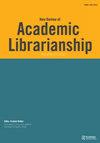Students as Co-authors of an Academic Development Service: A Case Study of the Study Skills Service at the University of Bristol
IF 2.3
Q2 INFORMATION SCIENCE & LIBRARY SCIENCE
引用次数: 2
Abstract
Abstract With university libraries increasingly viewed as the hub of academic development, (Pearson, 2003; Fallin, 2016) the University of Bristol has recently completed a pilot project to develop academic skills support embedded within its library services, as part of the University’s ‘Bristol Futures’ initiative. This pilot, ‘Study Skills’, was indicated following the findings of a ‘Transition to University Study Group’, aiming to identify ways in which the University could better enable its students to cope with the demands of university-level study. The service would in the first instance support the transition of undergraduate students into the University of Bristol on the understanding that some of the content would be equally applicable to taught postgraduate students. A careful process of scoping was carried out, including site visits to other Russell Group universities, consultations and focus groups with staff, and consultations with students to determine how they wished to be supported in this transition. The result was a business case which set out the remit and costs for a two-year pilot project based in Library Services, which already had a strong academic engagement team. The proposal called for a blended approach (Hughes, 2007), using online resources, individual tutorials and workshops. A key principle of the pilot was the involvement of students as co-authors at every level, from the design and tone through to the content and delivery. Initially a range of focus groups, interviews, testing and feedback techniques were used to ensure that the presentation and content had strong student input. Moreover, students were employed as co-writers and deliverers of content, particularly in workshops, where a training programme enabled progression from co-presentation through modification of existing sessions, to proposal, creation and sole delivery of their own workshops. These paid student roles (titled ‘Bristol Futures Advocates’) allowed development of delivery beyond generic content to more subject-specific skills development. Similar to Peer Assisted Study Sessions (PASS) support (Packham & Miller, 2000), the Advocates delivered short drop-in sessions where they offered advice and signposting to other areas of support at the University. The Advocates initially received intensive training followed by longitudinal training in the form of monthly information sessions and the opportunity to discuss and share best practice. The project has been a clear success, with a strong uptake and positive feedback from students. For example, 99% agreed that they felt more able to complete their work after a tutorial and 91% felt they understood the topic better after a workshop. Due to its success, the service has now become ‘business as usual’ as part of Library Services and expanded to a hub-and-spoke model (Gordon & de Neufville, 1973) with faculty-facing teams centred around the central ‘hub’ of the University’s Library Services. The relationship with other library teams, particularly the academic engagement team, has allowed Study Skills to be integrated and work collaboratively as part of a network of support for students. This case study therefore demonstrates the importance of careful scoping before setting up such a service, the strengths of student co-authorship, the value of paid student roles in delivering academic development opportunities across a vastly differing range of academic disciplines and the importance of finding the right home, in this case Library Services, for an academic development service.学生作为学术发展服务的合著者:布里斯托尔大学学习技能服务的案例研究
随着大学图书馆日益被视为学术发展的中心,(Pearson, 2003;Fallin, 2016)布里斯托尔大学最近完成了一个试点项目,开发嵌入其图书馆服务的学术技能支持,作为该大学“布里斯托尔未来”倡议的一部分。这项名为“学习技巧”的试点计划是根据“向大学学习小组过渡”的研究结果提出的,旨在确定大学如何更好地使学生能够应对大学水平的学习需求。该服务将首先支持本科学生进入布里斯托尔大学,但前提是其中一些内容同样适用于已授课的研究生。我们进行了仔细的范围界定过程,包括对罗素集团其他大学的实地考察,与工作人员进行磋商和焦点小组讨论,并与学生进行磋商,以确定他们希望如何在这种过渡中得到支持。结果是一个商业案例,该案例规定了图书馆服务部门为期两年的试点项目的权限和成本,该部门已经拥有一支强大的学术参与团队。该建议要求采用混合方法(Hughes, 2007),使用在线资源、个人教程和研讨会。试点的一个关键原则是让学生作为合作者参与到各个层面,从设计和基调到内容和交付。最初,我们使用了一系列焦点小组、访谈、测试和反馈技术来确保演示和内容得到了学生的大力投入。此外,学生被聘为内容的共同作者和交付者,特别是在讲习班中,培训方案使他们能够从共同陈述到修改现有会议,再到提出建议、创建和单独交付自己的讲习班。这些付费学生角色(被称为“布里斯托尔期货倡导者”)允许从通用内容发展到更具体的学科技能发展。与同伴辅助学习会议(PASS)支持类似(Packham & Miller, 2000),倡导者提供了短期的旁听会议,在那里他们为大学的其他支持领域提供建议和指示。倡导者最初接受强化培训,然后是每月信息会议形式的纵向培训,并有机会讨论和分享最佳做法。该项目取得了明显的成功,得到了学生们的强烈接受和积极反馈。例如,99%的人认为他们在接受了辅导后更有能力完成工作,91%的人认为他们在参加了研讨会后更好地理解了主题。由于它的成功,这项服务现在已经成为图书馆服务的一部分,并扩展到一个中心辐射型模式(Gordon & de Neufville, 1973),面向教师的团队集中在大学图书馆服务的中心“枢纽”周围。与其他图书馆团队的关系,特别是学术参与团队的关系,使“学习技巧”得以整合,并作为学生支持网络的一部分协同工作。因此,这个案例研究证明了在建立这样的服务之前仔细界定范围的重要性,学生合作的优势,有偿学生角色在提供学术发展机会方面的价值,以及为学术发展服务找到合适的家的重要性,在这个案例中是图书馆服务。
本文章由计算机程序翻译,如有差异,请以英文原文为准。
求助全文
约1分钟内获得全文
求助全文
来源期刊

New Review of Academic Librarianship
Social Sciences-Library and Information Sciences
CiteScore
3.40
自引率
0.00%
发文量
20
 求助内容:
求助内容: 应助结果提醒方式:
应助结果提醒方式:


